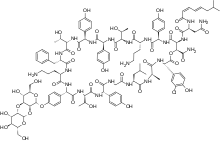Ramoplanin
Ramoplanin (INN) is a glycolipodepsipeptide antibiotic drug derived from strain ATCC 33076 of Actinoplanes.[1]
 | |
| Clinical data | |
|---|---|
| Routes of administration | Oral |
| ATC code |
|
| Legal status | |
| Legal status |
|
| Identifiers | |
| CAS Number | |
| PubChem CID | |
| ChemSpider | |
| UNII | |
| KEGG | |
| ChEBI | |
| ChEMBL | |
| ECHA InfoCard | 100.161.388 |
| Chemical and physical data | |
| Formula | C119H154ClN21O40 |
| Molar mass | 2554.07 g/mol g·mol−1 |
| 3D model (JSmol) | |
SMILES
| |
InChI
| |
| | |
Mechanism
It exerts its bacteriocidal effect by inhibiting cell wall biosynthesis, acting by inhibiting the transglycosylation step of peptidoglycan synthesis.[2]
Uses
Its development has been fast-tracked by the U.S. Food and Drug Administration as a treatment for multiple antibiotic-resistant Clostridium difficile infection of the gastrointestinal tract,[3] Unlike vancomycin, it is absorbed in the gastrointestinal tract, although it is unstable in the bloodstream, so can be taken only orally against Clostridium difficile infections of the gastrointestinal tract.[4][5][6]
References
- Farver DK, Hedge DD, Lee SC (May 2005). "Ramoplanin: a lipoglycodepsipeptide antibiotic". The Annals of Pharmacotherapy. 39 (5): 863–8. doi:10.1345/aph.1E397. PMID 15784805.
- Fang X, Tiyanont K, Zhang Y, Wanner J, Boger D, Walker S (January 2006). "The mechanism of action of ramoplanin and enduracidin". Molecular BioSystems. 2 (1): 69–76. doi:10.1039/b515328j. PMID 16880924.
- Fulco P, Wenzel RP (December 2006). "Ramoplanin: a topical lipoglycodepsipeptide antibacterial agent". Expert Review of Anti-Infective Therapy. 4 (6): 939–45. doi:10.1586/14787210.4.6.939. PMID 17181409.
- Scheinfeld N (January 2007). "A comparison of available and investigational antibiotics for complicated skin infections and treatment-resistant Staphylococcus aureus and enterococcus". Journal of Drugs in Dermatology. 6 (1): 97–103. PMID 17373167.
- Balagopal A, Sears CL (October 2007). "Clostridium difficile: new therapeutic options". Current Opinion in Pharmacology. 7 (5): 455–8. doi:10.1016/j.coph.2007.05.007. PMID 17644040.
- Gerding DN, Muto CA, Owens RC (January 2008). "Treatment of Clostridium difficile infection". Clinical Infectious Diseases. 46 Suppl 1: S32–42. doi:10.1086/521860. PMID 18177219.
This article is issued from
Wikipedia.
The text is licensed under Creative
Commons - Attribution - Sharealike.
Additional terms may apply for the media files.